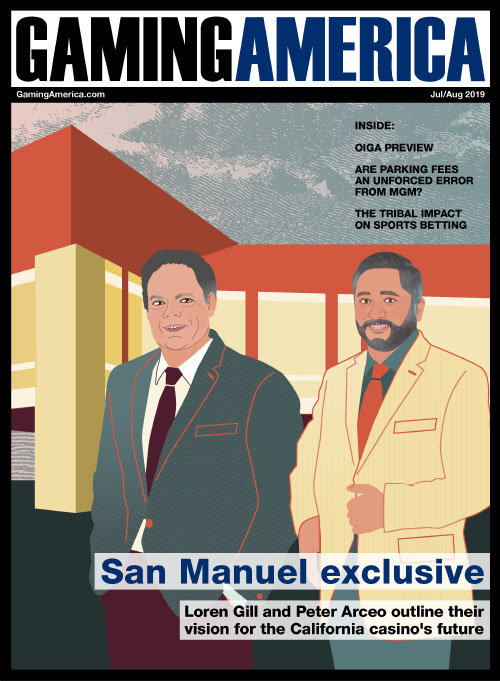
With the federal ban on sports betting lifted, the gaming industry entered a new era in 2018, and states across the country moved to action. At the time of writing, residents in eight US states can legally place sports wagers, with eight more states plus Washington D.C. poised to open their own markets soon.
Bettors have wagered more than $3.37bn in legal sports bets outside Nevada since last May. Meanwhile, Nevada’s sportsbooks experienced their best year on record for 2018. With public support on our side - eight in 10 Americans support legalizing sports betting in their state - the expansion of legal sports betting is set to continue and thrive around the country.
The rapid expansion of legal sports betting in the US is truly remarkable for the industry broadly as well as the states and communities where gaming operates. It is also something I would not have imagined in my lifetime. But with this expansion, there is the responsibility to protect the integrity of the game by preventing fraud and abuse and, ultimately, stamping out the illegal market. This is high stakes for everyone involved and success will require true collaboration between regulators, law enforcement and the gaming industry.
Before a single bet can be wagered, it is crucial for states to establish regulatory frameworks that protect consumers, benefit state and local economies and support a healthy gaming industry. I am encouraged that as states have started to regulate the frameworks, they have met this standard and I am confident this will continue to be the case. In fact, as we see states begin this important policy and regulatory task, it reinforces the importance of leaving regulation to the states, as a federalized system would be too cumbersome and, simply put, would not work.
Moving forward, policymakers and regulators should look to Nevada—with more than half a century of success—as the gold standard. As a former chairman of the Nevada Gaming Control Board, I have seen first-hand the outcomes of what happens when regulators, law enforcement and the gaming industry work together. Nevada’s market was established with robust provisions that protect the integrity of games, wagers and data, while promoting responsible gaming. Fair tax rates, convenient access and stringent regulatory safeguards all contribute to Nevada’s success.
Sports wagering is already happening in every state across the country—just not legally. The main reason bettors participate in the illegal market is that, until recently, it was the only accessible market in many states. State regulatory provisions can help incentivize the public to wager legally instead of through illegal methods. But convenient access to legal, regulated sports betting is only half the battle. Just as important is making sure the odds offered in the legal market are competitive with illegal bookies and offshore operators that don’t pay taxes. Since sports betting is an inherently low-margin business, it is critical that legal frameworks are built with a reasonable tax rate which enables sportsbooks to offer attractive odds.
Successful legal markets also involve vigilant monitoring to drive out potential illicit activity. This is accomplished only through strict regulation and experienced sports betting operators, along with the mutual goal of patron protection. Again, you can look to the success of the Nevada market, where regulators and law enforcement use a combination of tactics to go after the illegal market, including bolstering criminal penalties for crimes related to illegal sports betting, ISP blocking, restricting financial transactions and forfeiting funds. These methods can be readily duplicated across new legal markets.
In addition to creating thoughtful state frameworks, regulators, law enforcement and the gaming industry should complete internal and external needs assessments to determine where additional work is needed to end the illegal gaming market. We must stay in regular contact with the public through ongoing research and effectiveness monitoring to ensure consumers feel safe placing bets and to gauge what safeguards and commitments they expect from a well-regulated market.
Similarly, the industry needs to fully understand from regulators and law enforcement what resources are needed in the fight against illegal gambling and to guarantee the protection of consumers.
As any regulator will tell you, one of the biggest benefits of a legal sports betting market is the involvement of gaming operators with regulators to actively promote consumer protections and responsible gaming resources while simultaneously answering to the law. Through their transparent collaboration, including data sharing and fraud prevention measures, Nevada regulators, law enforcement and casino operators have created a blueprint for emerging markets to follow.
It is crucial that regulators, law enforcement and the gaming industry work together to draw a clear line between legal and illegal betting, including by preventing illegal operators from enticing consumers through deceptive advertising.
We already know there is an awareness gap the industry needs to address. In states where casino sports betting is legal, only 56% of people are aware that it is. Cracking down on illegal and offshore advertising can help safeguard consumers from the dangers of the unregulated market by preventing them from being targeted by illegal operators in the first place.
This healthy teamwork would not be possible without strong industry buy-in. The gaming industry is already moving to protect consumers and promote responsible gaming, particularly by ensuring sports betting advertising is restricted to appropriate audiences. Recently, members of the gaming industry committed to self-regulation of marketing and advertising for sports wagering. The American Gaming Association’s Responsible Marketing Code for Sports Wagering, modeled after the effective, long-standing codes of other highly-regulated industries, sets a high standard for sports betting advertising for operators, teams and the broader sports and gaming industry.
The adherence and enforcement of this code will help separate good actors from bad. With these types of industry commitments in place, regulators can rest assured there is a strong industry foundation upon which to ensure advertising of legal betting is done in a responsible way.
As new markets continue to emerge, regulators, law enforcement and the gaming industry will be working more closely than ever – a beneficial relationship for both consumer safety and market integrity. The good news is that all of these stakeholders are working hard on this right now. There are constant ongoing discussions and work is being done among all involved to make sure the right thing is done.
To successfully eliminate the illegal market and ensure sports betting is enjoyed by the appropriate audience, new markets should continue emulating Nevada’s tried and trusted system of collaboration and industry commitment to responsibility in gaming. They can do so by continuing to draw a bright and clear line between legal and illegal gambling and maintaining open lines of interagency communication. So far, we are off to a great start.
A.G. Burnett is the former Chairman of the Nevada Gaming Control Board (NGCB). He is currently a partner in the Gaming & Administrative Law Group with McDonald Carano.

